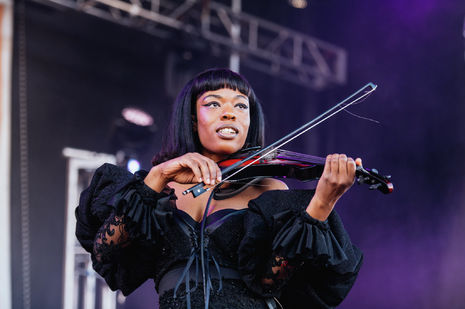
Sudan Archives
Self-taught violinist Brittney Parks is Sudan Archives. Whether playing alongside electronic pedals or a string quartet, Parks creates music that stirs both mind and body. As she told the Guardian in 2022, “I’m a deep, insightful person, but I’m also fucking silly”. Her music deftly navigates this balance – even within each vividly crafted piece. While some tracks leave vibrating strings to echo alone, others introduce pounding beats, wresting the violin from its often staid associations – associations Parks rejects, taking her inspiration from Irish and Sudanese fiddling. You can’t help feeling the freedom of her sound, a movement vividly underlined in concert, where performer and instrument dance around the stage, glittering and twisting. Her work’s ethereality remains deeply rooted – feet on the ground, dancing.
Daniel Johnston
Recorded on home cassettes, initially passed out from the Texan McDonalds where he worked, Daniel Johnston’s music is raw and intimate. His pining tones ring out amidst soft crackling, repeating piano chords, and sparse guitar. ‘Walking the Cow’ opens with toy-box pig noises, while a plaintive voice asks, “hi, how are you?”. The following refrain “lucky stars in your eyes / I am walking the cow” captures Johnston’s tenderness, one always inflected with a sense of loss. ‘True Love Will Find you in the End’ repeats “don’t be sad, I know you will”, a strangely adolescent voice holding nostalgia and wisdom. The intermingling of pain and naivety is characteristic of Johnston’s work, where tentative, childlike wonder overlays near-constant undertones of despair. Johnston’s sound, like his life, is troubled, but determinedly feeling and resolutely vulnerable.
Leenalchi
This South Korean band takes its name from Lee Nal-chi, the 19th century master of Pansori folk music and Jultagi – tightrope-walking. Pansori, usually performed by a singer and drummer, has been translated as “folk operatic song”: Leenalchi marry this with the pulse of pop, expanding their sound to include three singers and two bassists. Both Jultagi and Pansori are storytelling arts: Leenalchi’s repertoire brims with narrative, telling each tale through oscillating sounds as well as words. ‘Tiger is Coming’ from 2020’s SUGUNGGA conjures a beast with “Silkworm head waving / electric front legs”, an electricity that sustains each of their tracks. Many of these songs take their names directly from Pansori versions – they preserve the narrative impulse and hypnotism of their traditional inspiration, wrapping it in rhythm and energy. The resulting force is transfixing yet animating.
Susumu Yokota
Susuma Yokota was a prolific composer, DJ and producer. He performed under many different pseudonyms, shifting between techno, house and ambient electronica. His 2022 album, Symbol, mixes romantic samples from classical music with synth and computerised beats, overlayed with floating female vocals. The result is ethereal and lush, inviting you into a glimmering soundscape. ‘Song of the Sleeping Forest’ features paced rhythmic percussion, interlocking gliding symphony snippets and soaring voices. Yokota’s body of work ebbs and flows, at times insistent, at others gentle and gossamer fine. He draws together shimmering forests, orchestral swellings and the vibrations of 90s dance – gathering us up in a succession of swooping and transcendent tracks.
Suburban Lawns
This early eighties band hovers between punk, new wave, and weird, bouncing rock. Suburban Lawn’s music is fast and frenetic, with a tone both disaffected and enthusiastic. ‘Janitor’, their most popular song, emphasises the cool yet ranging voice of singer Su McLane, one that becomes increasingly strange and pitched. They play with words and sound, somehow droll yet verging on feral. In ‘Mom And Dad And God’, “Dad’s a perfectionist / And Mom’s a beautician / He is into sin / She’s into contrition”, as energetic percussion and catchy guitar refrains form a spirited baseline. Their sound is ricocheting and fun, promising sardonic mirth and freaky glee. Suburban Lawns will whisk you away on a journey at once trippy, arbitrary and kinetic.
“They play with words and sound, somehow droll yet verging on feral”
Kadhja Bonet
Kadhja Bonet’s music is part folk, part psychedelic soul. Quavering strings are peppered with clinking, twinkling sounds, as her soft, layered voice rings out – spellbinding, but not saccharine or flimsy. Her songs range between contentment, melancholy and exuberance, but are always shrouded in warmth. On the crystalline ‘Delphine’, deep twanging accompaniment and Bonet’s smooth, slow voice talk of a “strange ‘hello’’”, asking “could this be about growing veins / And feeling lost?” Bonet’s work metamorphoses and swings, softly dwelling on childhood and the waxing and waning of growing up, never settling.
Puuluup
Soaring strings and deadpan delivery partner in the works of self-proclaimed Neo-Zombie-Post-Folk duo Puuluup. Neo-zombie because they play the resurrected talharpa: a four stringed traditional lyre widespread in Estonia before it was driven to near extinction. Post-folk delivered with a wry smile. The name ‘Puuluup’, roughly meaning ‘wood magnifier’, comes from the duo’s use of looping pedals, by which they precisely layer voice and string to create detailed and echoing soundscapes. Their music has a playful seriousness, ranging from the melancholy insistence of ‘Homme On Julgem’ that “tomorrow will be braver” to the story in ‘Paala Järve Vaala Baar’ of a whale and his favourite bar. Puuluup tether a deep history to their untethered and strangely stirring musical vision. The resulting surrealism, synchronicity and soul of their work garners an intimate connectivity – the talharpa is resurrected, like all zombies, in a journey of wistful communication
Varsity’s Songs of 2023

